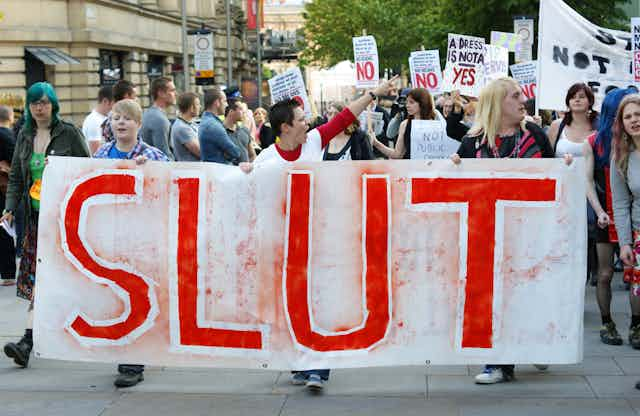Slut, slag, ho, punta, hoochie, skank, slag. The list of words used to shame or criticise women for their sexual availability – be it perceived or real – is endless. Women’s behaviour, conduct, sexuality and sexual expression has been policed via slut-shaming for centuries, while men’s behaviour is overlooked.
Women are told they are equal in our supposedly post-feminist society, yet we have recently seen a resurgence in feminist activism, focusing in particular on sexual violence and assault. And while there are a number of notable initiatives, including Reclaim the Night and mini-skirt marches, of particular importance was the emergence of SlutWalk.
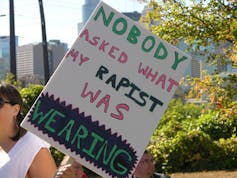
Beginning in 2011, this anti-rape and anti-victim blaming movement has spread to more than 200 cities in 40 countries. It has mobilised tens of thousands of women, men and children.
The movement was inspired by a Toronto police officer who advised women that they could avoid rape by not dressing like “sluts”. With its simple message that clothes don’t cause rape, SlutWalk spoke to a whole generation of young women who were tired of being blamed for the actions of others, or told the responsibility for preventing rape rested squarely on their shoulders.
Starting in Toronto, the movement went viral in the feminist blogosphere before being picked up by the mainstream news. Shortly after the first march in April 2011, it quickly spread to other Canadian cities before migrating to the US, Central and South America, Europe, Africa and Asia.
Most SlutWalks begin with a march, ending with a range of speeches from sexual assault survivors, sex workers, and members of anti-rape organisations. In several cases, the march is either preceded or followed by a range of events including consent workshops, flashmobs, film screenings, poetry readings, and more.
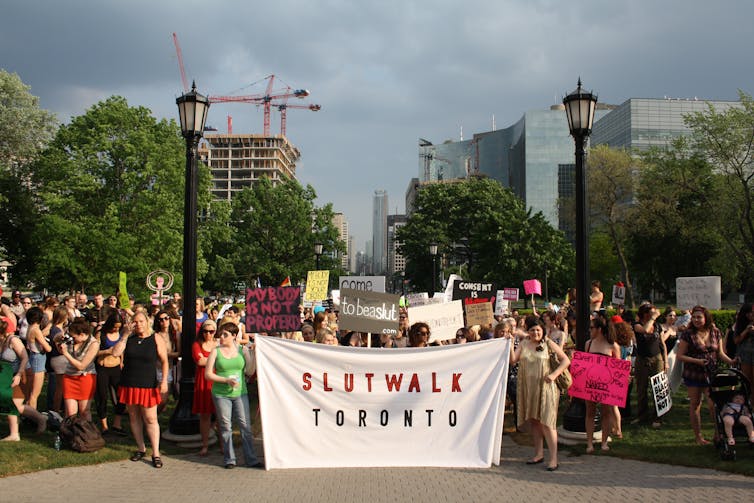
Marches range in size from year to year and place to place, but the smallest would attract a few dozen people, while the largest would attract tens of thousands. The 2014 march in Reykjavík, Iceland attracted a record breaking 11,000 people.
To date, SlutWalks have been held in major cities such as Johannesburg, Jerusalem, Sydney, Ottawa, Seoul, London, Singapore, and Rio De Janeiro. In 2015, marches have already taken place or are planned in cities such as Chicago, Washington DC, Miami, New Orleans, Melbourne, Vancouver and LA.
On the march
As a grassroots political movement, SlutWalk has been shaped by local issues, current events, and how the organisers of each march understand sexual violence and rape culture. For example, in Mexico, the focus was on femicide, while in South Africa it was on so-called “corrective rape” for lesbians. In India, the focus has been on dowry traditions and eve-teasing, while Honduras focused on challenging homophobia.
What holds all the walks together under one banner though is the commitment to challenging rape culture and myths about the nature of rape – including who is likely to commit it and who is likely to be a victim.
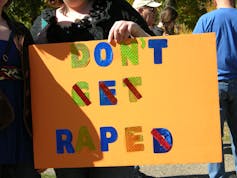
SlutWalk targets rape myths because they prevent people from even recognising sexual assault for what it is. As evidence of this, in August 2012, while SlutWalks were marching into their second year, a 16-year-old high school student in Steubenville, Ohio was raped by two classmates while passed out at a party.
During the attack, other party-goers sent out images of and texts about the assault via social media. No-one attempted to intervene. Asked why, one witness said: “It wasn’t violent. I didn’t know exactly what rape was. I thought it was forcing yourself on someone”.
Shamed into change
It is precisely this type of view that SlutWalk and other women’s rights organisations are trying to change. That will of course take time, but there is some evidence of movement. In November 2014 for example, the New Orleans police department announced that it would review hundreds of mishandled sex crimes.
And in the UK, the police has vowed to change the way it investigates sex crimes after admitting that “unconscious bias” was preventing officers from taking many rape allegations seriously.
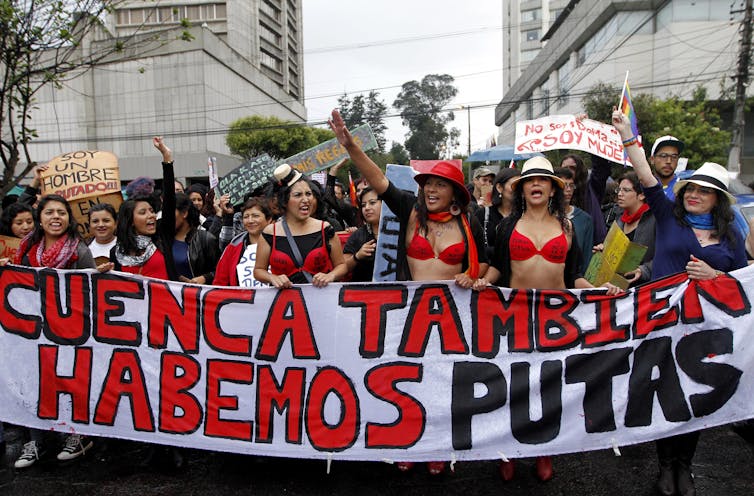
In fact, scarcely a day goes by without at least one mainstream news story related to sexual violence prevention. Whether it’s India’s newly elected government pledging zero tolerance on violence against women, or even professional sports associations such as the US National Football League revising their policies on domestic violence.
Governments are finally recognising that rape prevention requires collective, rather than individual solutions, which is a major development worth celebrating. Sexual violence seems to be moving from a personal issue to a truly political one – and movements like SlutWalks have played a big part in that.
Although SlutWalks no longer attract mainstream media headlines, there is no doubt the movement helped pave the way for the contemporary resurgence of feminist activism. Women and men around the world are starting to both recognise and speak out against a range of practices, beliefs and laws that promote or uphold rape culture.

